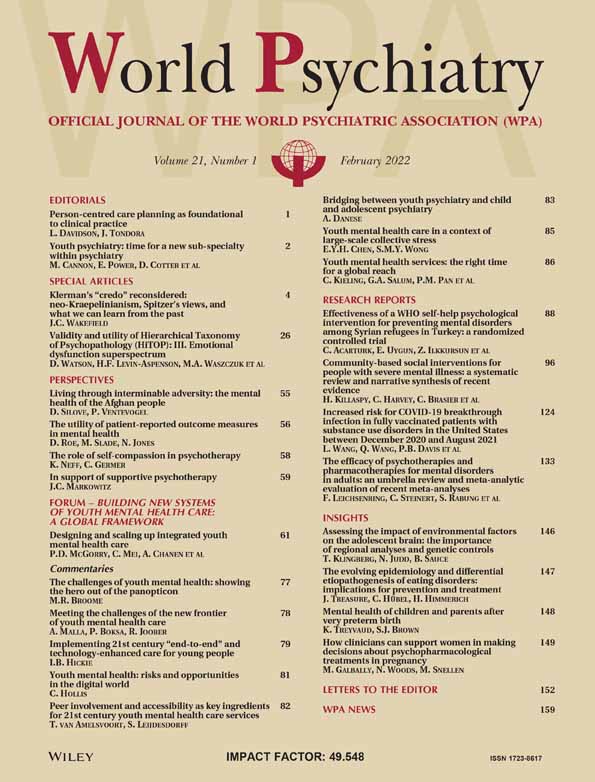Beyond symptom improvement: transdiagnostic and disorder-specific ways to assess functional and quality of life outcomes across mental disorders in adults.
IF 65.8
1区 医学
Q1 Medicine
引用次数: 0
Abstract
Improving meaningful outcomes is the main goal of clinical care for mental disorders. Traditionally, the focus in clinical research and practice has been on outcome domains that refer to symptom severity or service use (e.g., hospitalization), relate to categorical diagnoses, and favour clinician-rated measures. More recently, self-rated and dimensional as well as transdiagnostic outcome domains have gained traction, and functioning, quality of life and well-being/life satisfaction, along with the construct of personal recovery, have become a stronger focus. These key multidimensional outcome domains need to be properly defined and assessed. Further, the concepts of "functional" and "personal" recovery need to be differentiated. "Functional recovery" is defined by observed functioning across the domains of self-care, social interactions, leisure time activities, and educational or vocational activities. "Personal recovery" involves the subjective sense of living a personally meaningful life, irrespective of whether symptoms continue, or ongoing/intermittent support is needed. Despite the multi-stakeholder relevance of these outcome domains, no comprehensive account of how to measure them is available. To fill this gap, we provide here an overview of the main tools to assess functioning, quality of life/well-being/life satisfaction, and personal recovery outcomes across mental disorders in adults, aiming to also identify additional needs that should be addressed. We identified tools that can be used in clinical and research practice to assess people with the following mental health conditions: anxiety disorders, bipolar disorder, dementias, eating disorders, major depressive disorder, obsessive-compulsive and related disorders, personality disorders, post-traumatic stress disorder, schizophrenia, and substance use disorders. Both transdiagnostic and disorder-specific measures are described. Suggested tools were selected keeping feasibility and scalability needs in mind. The incorporation of these measures in both research and clinical care will enrich patient assessment as well as treatment planning and evaluation, increasing the likelihood of enhanced outcomes in people living with mental disorders.超越症状改善:评估成人精神障碍患者功能和生活质量结果的跨诊断和疾病特异性方法
改善有意义的结果是精神障碍临床护理的主要目标。传统上,临床研究和实践的重点一直放在与症状严重程度或服务使用(例如住院)有关的结果领域,与分类诊断有关,并倾向于临床评估措施。最近,自评和维度以及跨诊断结果领域得到了关注,功能、生活质量和幸福/生活满意度,以及个人康复的构建,已经成为一个更强的焦点。需要对这些关键的多维结果域进行适当的定义和评估。此外,需要区分“功能”和“个人”康复的概念。“功能恢复”是通过观察到的自我照顾、社会互动、休闲活动、教育或职业活动等领域的功能来定义的。“个人康复”涉及对个人有意义的生活的主观感觉,无论症状是否持续,或是否需要持续/间歇的支持。尽管这些结果领域与多利益相关者相关,但没有关于如何衡量它们的全面说明。为了填补这一空白,我们在这里概述了评估成人精神障碍的功能、生活质量/幸福/生活满意度和个人康复结果的主要工具,旨在确定应该解决的其他需求。我们确定了可用于临床和研究实践的工具,以评估患有以下精神健康状况的人:焦虑症、双相情感障碍、痴呆、饮食失调、重度抑郁症、强迫症及相关障碍、人格障碍、创伤后应激障碍、精神分裂症和物质使用障碍。描述了跨诊断和疾病特异性措施。选择建议的工具时要考虑可行性和可伸缩性需求。将这些措施纳入研究和临床护理将丰富患者评估以及治疗计划和评估,增加精神障碍患者改善结果的可能性。
本文章由计算机程序翻译,如有差异,请以英文原文为准。
求助全文
约1分钟内获得全文
求助全文
来源期刊

World Psychiatry
Nursing-Psychiatric Mental Health
CiteScore
64.10
自引率
7.40%
发文量
124
期刊介绍:
World Psychiatry is the official journal of the World Psychiatric Association. It aims to disseminate information on significant clinical, service, and research developments in the mental health field.
World Psychiatry is published three times per year and is sent free of charge to psychiatrists.The recipient psychiatrists' names and addresses are provided by WPA member societies and sections.The language used in the journal is designed to be understandable by the majority of mental health professionals worldwide.
 求助内容:
求助内容: 应助结果提醒方式:
应助结果提醒方式:


